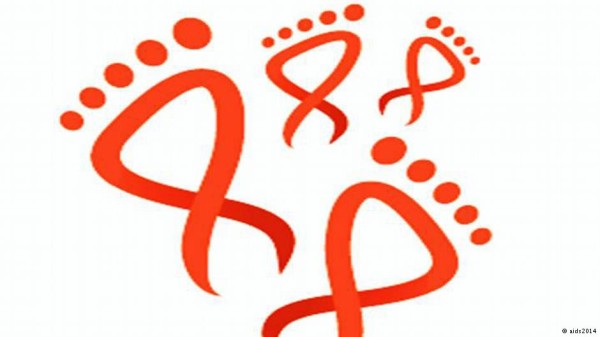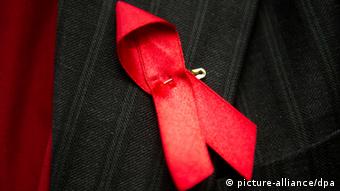At least six top AIDS experts were killed in the Malaysia Airlines passenger plane crash. The International AIDS Conference is taking place regardless – DW reviews the key topics being discussed.
They were on their way to the 20th annual International AIDS Conference in Melbourne, Australia: outstanding AIDS experts, scientists and assistants. The international community was shocked by the news of the Malaysian plane crash – but conference participants have been devastated.
The conference will still go on, from July 20 to 25, with attendees holding to the program as much as possible. The conference motto is “Stepping up the pace.”
The logo of the conference, four feet stylized by ribbons, stands for increased scientific, medical and social understanding of AIDS, according to organizers. The different-sized feet are intended to symbolize how people of different ages and genders are affected by HIV – yet they are all on the same path.
Comprehensive prevention
People with HIV/AIDS should not be discriminated against or stigmatized – this assertion forms the central issue in this year’s conference. Around 12,000 participants registered for discussion on the state and development of HIV/AIDS research. The disease still continues to be incurable; prophylaxis is becoming an ever-greater focus of research.
Medicines that hinder the spread of the virus are among the topics. Pre-exposure prophylaxis is also on the agenda, said AIDS expert Norbert Brockmeyer – this could prevent a large proportion of infections.
“That also includes preventive measures for children: How can we protect them from an infection, especially in developing countries? How can we take better care of the mothers?” Brockmeyer told DW. “These are medical and also social questions which will be discussed, and for which scientists need to find answers,” he said.
Successes and failures
The UN published new figures just a few days ahead of the conference: around 2.1 million people were newly infected with the human immunodeficiency virus in the past year. The number of people killed by the virus fell 200,000 to 1.5 million people – a positive trend, said Brockmeyer.
Politics and individual governments play an important role in the discussion about HIV/AIDS – this includes, among other things, issuing guidelines around handling of groups at high risk of contracting HIV, which the UN published in July.
Central topics are the discrimination and stigmatization of homosexuals, prostitutes and drug addicts. In some countries, the law discriminates against such groups. This gives the virus a better chance to spread, said Brockmeyer.
The Melbourne Declaration
“Nobody left behind” is the title of a declaration already drafted by the organizers ahead of the Melbourne conference. Ending discrimination and stigmatization is one of its central demands. The declaration wants governments to legally establish equal treatment among HIV risk groups and guarantee everybody a right to prophylaxis, therapy and information.
“The more people are informed about HIV/AIDS and the better the information campaigns are, the more likely it is that they can protect themselves,” said Brockmeyer. “And the more antiretroviral drugs are handed out, the fewer people will be infected by the virus,” he added.
Several organizations from around the world have already sign on to the Melbourne Declaration – among them the Global Fund to Fight AIDS, Tuberculosis and Malaria; the French organizations Sidaction and Aides; as well as the AIDS Action Europe network. It will still take some time until a vaccine or a drug that cures AIDS can be developed. But Brockmeyer is convinced that “we are on the right path.”
Brockmeyer believes that the tragic plane crash and death of so many colleagues will lead to even more intensive AIDS research – in the spirit of the victims.












